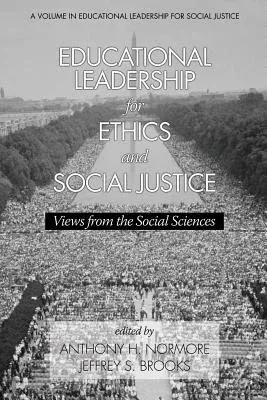A volume in Educational Leadership for Social Justice Series Editor
Jeffrey S. Brooks, University of Idaho, Denise E. Armstrong, Brock
University; Ira Bogotch, Florida Atlantic University; Sandra Harris,
Lamar University; Whitney H. Sherman, Virginia Commonwealth University;
George Theoharis, Syracuse University The purpose of this book is to
examine and learn lessons from the way leadership for social justice is
conceptualized in several disciplines and to consider how these lessons
might improve the preparation and practice of school leaders. In
particular, we examine philosophy, anthropology, sociology, economics,
political science, public policy, and psychology. Our contention is that
the field of educational leadership might consider taking a step
backward in order to take several forward. That is, educational
leadership researchers might re-examine social justice, both in terms of
social and individual dynamics and as disciplinary-specific,
multidisciplinary and interdisciplinary phenomenon. By adopting this
approach, we can connect and extend long-established lines of conceptual
and empirical inquiry and thereby gain insights that may otherwise be
overlooked or assumed. This holds great promise for generating,
refining, and testing theories of social justice in educational
leadership and will help strengthen already vibrant lines of inquiry.
That is, rather than citing a single, or a few, works out of their
disciplinary context it might be more fruitful to situate educational
leadership for social justice research in their respective traditions.
This could be carried out by extending extant lines of inquiry in
educational leadership research and then incorporating lessons gleaned
from this work into innovative practice. For example, why not more
clearly establish lines of educational leadership and justice research
into the Philosophy of Social Justice, Economics of Social Justice,
Political Studies of Social Justice, Sociology of Social Justice,
Anthropology of Social Justice, and the Public Policy of Social Justice
as focused and discrete areas of inquiry? Once this new orientation
toward the knowledge base of social justice and educational leadership
is laid, we might then seek to explore some of the natural connections
between traditions before ultimately investigating justice in
educational leadership through a free association of ideas as the worlds
of practice and research co-construct a "new" language they can use to
discuss educational leadership. Such an endeavor may demand
reconceptualization of both the processes and products of collaborative
research and the communication of findings, but it will demand a
breaking-down of methodological and epistemological biases and a more
meaningful level and type of engagement between primary and applied
knowledge bases.


